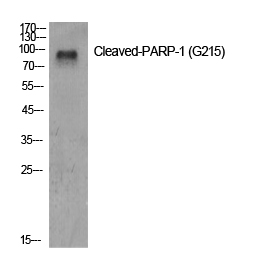Cleaved-PARP-1 (G215) Polyclonal Antibody
- Catalog No.:YC0073
- Applications:WB;ELISA
- Reactivity:Human;Mouse;Rat
- Target:
- PARP
- Fields:
- >>Base excision repair;>>NF-kappa B signaling pathway;>>Apoptosis;>>Necroptosis;>>Diabetic cardiomyopathy
- Gene Name:
- PARP1
- Protein Name:
- Poly [ADP-ribose] polymerase 1
- Human Gene Id:
- 142
- Human Swiss Prot No:
- P09874
- Mouse Swiss Prot No:
- P11103
- Immunogen:
- The antiserum was produced against synthesized peptide derived from human PARP. AA range:196-245
- Specificity:
- Cleaved-PARP-1 (G215) Polyclonal Antibody detects endogenous levels of fragment of activated PARP-1 protein resulting from cleavage adjacent to G215.
- Formulation:
- Liquid in PBS containing 50% glycerol, 0.5% BSA and 0.02% sodium azide.
- Source:
- Polyclonal, Rabbit,IgG
- Dilution:
- WB 1:500 - 1:2000. ELISA: 1:5000. Not yet tested in other applications.
- Purification:
- The antibody was affinity-purified from rabbit antiserum by affinity-chromatography using epitope-specific immunogen.
- Concentration:
- 1 mg/ml
- Storage Stability:
- -15°C to -25°C/1 year(Do not lower than -25°C)
- Other Name:
- PARP1;ADPRT;PPOL;Poly [ADP-ribose] polymerase 1;PARP-1;ADP-ribosyltransferase diphtheria toxin-like 1;ARTD1;NAD(+) ADP-ribosyltransferase 1;ADPRT 1;Poly[ADP-ribose] synthase 1
- Observed Band(KD):
- 89kD
- Background:
- This gene encodes a chromatin-associated enzyme, poly(ADP-ribosyl)transferase, which modifies various nuclear proteins by poly(ADP-ribosyl)ation. The modification is dependent on DNA and is involved in the regulation of various important cellular processes such as differentiation, proliferation, and tumor transformation and also in the regulation of the molecular events involved in the recovery of cell from DNA damage. In addition, this enzyme may be the site of mutation in Fanconi anemia, and may participate in the pathophysiology of type I diabetes. [provided by RefSeq, Jul 2008],
- Function:
- catalytic activity:NAD(+) + (ADP-D-ribosyl)(n)-acceptor = nicotinamide + (ADP-D-ribosyl)(n+1)-acceptor.,function:Involved in the base excision repair (BER) pathway, by catalyzing the poly(ADP-ribosyl)ation of a limited number of acceptor proteins involved in chromatin architecture and in DNA metabolism. This modification follows DNA damages and appears as an obligatory step in a detection/signaling pathway leading to the reparation of DNA strand breaks.,miscellaneous:The ADP-D-ribosyl group of NAD(+) is transferred to an acceptor carboxyl group on a histone or the enzyme itself, and further ADP-ribosyl groups are transferred to the 2'-position of the terminal adenosine moiety, building up a polymer with an average chain length of 20-30 units.,PTM:Phosphorylated by PRKDC. Phosphorylated upon DNA damage, probably by ATM or ATR.,PTM:Poly-ADP-ribosylated by PARP2.,similarity:Contains 1 BRCT
- Subcellular Location:
- Nucleus . Nucleus, nucleolus . Chromosome . Localizes to sites of DNA damage. .
- Expression:
- Brain,Colon carcinoma,Fibroblast,Lung,Ovarian carcinoma,Skin,
The role of SIRT1 in BMP2-induced chondrogenic differentiation and cartilage maintenance under oxidative stress.. Aging-US Aging-Us. 2020 May 31; 12(10): 9000–9013 WB Mouse 1:500 C3H10T1/2 cells
Mangiferin improves hepatic damage-associated molecular patterns, lipid metabolic disorder and mitochondrial dysfunction in alcohol hepatitis rats. Food & Function Food Funct. 2019 Jun;10(6):3514-3534 IHC Rat Liver, kidney , spleen
Loss of Tctn3 causes neuronal apoptosis and neural tube defects in mice. Cell Death & Disease Cell Death Dis. 2018 May;9(5):1-12 WB Mouse 1:100 brain
Exogenous Adipokine Peptide Resistin Protects Against Focal Cerebral Ischemia/Reperfusion Injury in Mice. NEUROCHEMICAL RESEARCH Neurochem Res. 2017 Oct;42(10):2949-2957 WB Mouse right hemisphere
RNAi-mediated knockdown of the CLN3 gene inhibits proliferation and promotes apoptosis in drug-resistant ovarian cancer cells. Molecular Medicine Reports 2015 Nov 01 WB Human 1:1000 A2780 cell
Sodium butyrate induces autophagic apoptosis of nasopharyngeal carcinoma cells by inhibiting AKT/mTOR signaling. BIOCHEMICAL AND BIOPHYSICAL RESEARCH COMMUNICATIONS Biochem Bioph Res Co. 2019 Jun;514:64 WB Human 5–8F cell, HK-1 cell
Shikonin potentiates therapeutic efficacy of oxaliplatin through reactive oxygen species-mediated intrinsic apoptosis and endoplasmic reticulum stress in oxaliplatin-resistant colorectal cancer cells DRUG DEVELOPMENT RESEARCH Yajie Zhang WB Human,Mouse HCT116R-xenograft OXA-resistant CRC cells (HCT116R)
- June 19-2018
- WESTERN IMMUNOBLOTTING PROTOCOL
- June 19-2018
- IMMUNOHISTOCHEMISTRY-PARAFFIN PROTOCOL
- June 19-2018
- IMMUNOFLUORESCENCE PROTOCOL
- September 08-2020
- FLOW-CYTOMEYRT-PROTOCOL
- May 20-2022
- Cell-Based ELISA│解您多样本WB检测之困扰
- July 13-2018
- CELL-BASED-ELISA-PROTOCOL-FOR-ACETYL-PROTEIN
- July 13-2018
- CELL-BASED-ELISA-PROTOCOL-FOR-PHOSPHO-PROTEIN
- July 13-2018
- Antibody-FAQs
- Products Images

- Wang, Bin, et al. "Loss of Tctn3 causes neuronal apoptosis and neural tube defects in mice." Cell death & disease 9.5 (2018): 520.

- Mao, Dongwei, et al. "RNAi-mediated knockdown of the CLN3 gene inhibits proliferation and promotes apoptosis in drug-resistant ovarian cancer cells." Molecular medicine reports12.5 (2015): 6635-6641.

- Western Blot analysis of various cells using Cleaved-PARP-1 (G215) Polyclonal Antibody diluted at 1:500
.jpg)
- Western Blot analysis of rat-musle cells using Cleaved-PARP-1 (G215) Polyclonal Antibody diluted at 1:500



